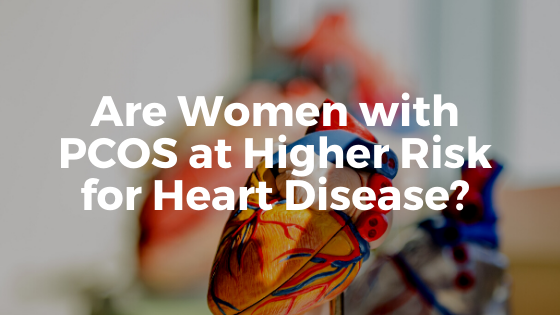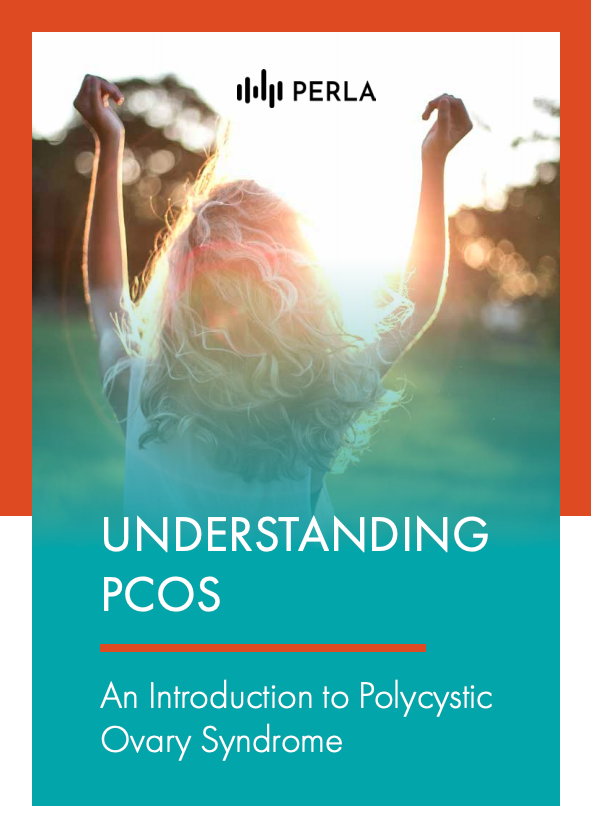Heart disease, sometimes also called by the broader term cardiovascular disease, is one of the long-term health risks associated with polycystic ovary syndrome (PCOS)1. If you have PCOS, it is important to have your heart and overall health monitored regularly by a doctor or healthcare provider who has experience treating women with PCOS. But how is PCOS and heart disease connected, and is there really a higher risk?
The Link between PCOS and Heart Disease
Many women with PCOS are dealing with excess weight, insulin resistance, and hypertension2, all of which increase the risk of developing heart disease. Insulin resistance is a risk factor for type 2 diabetes, so women with PCOS are especially at risk for developing diabetes. More than half of the women affected by the syndrome develop diabetes by age 40.3
If you have insulin resistance, you can produce insulin but can’t use it effectively, so you need higher than normal amounts of insulin to maintain normal blood glucose levels. The pancreas overcompensates and produces more insulin, resulting in excess insulin in the blood, also known as hyperinsulinemia.
Weight gain and accumulation of fat, particularly in the abdomen area (visceral obesity), are common among women with PCOS. This can lead to insulin resistance, higher triglycerides, and lower levels of the “good” cholesterol called HDL. All these are risk factors for stroke and heart disease.
Women with PCOS are advised to be aware of the heart-related complications associated with the syndrome. To reduce your risk of developing heart disease later in life, you should talk to your doctor about your risk factors and monitor your blood pressure and cholesterol on a regular basis.
PCOS and Metabolic Syndrome
Metabolic syndrome refers to a cluster of conditions or risk factors that often occur together and increase a person’s risk for developing diabetes, heart problems, and stroke.4 Metabolic syndrome is also known as Syndrome X, dysmetabolic syndrom, insulin resistance syndrome, obesity syndrome or hypertriglyceridemic waist. Those are all terms that describe the same condition.
Understanding the role of metabolic risk factors in causing heart disease is important as many women with PCOS have features of metabolic syndrome.5 You can be diagnosed with metabolic syndrome if you have three or more of the following features:6
- Abdominal obesity (waist measurement of greater than 35 inches)
- Impaired glucose tolerance (fasting glucose of 100 mg/dL or greater)
- High blood pressure (BP of 130/85 mm Hg or greater)
- High blood cholesterol
- Triglyceride of 150 mg/dL or greater
- HDL of less than 50 mg/dL
The prevalence of metabolic syndrome increases with age. Women affected by PCOS are up to 11 times more likely to have metabolic syndrome.7
Reduce Your Risk of Heart Disease
Heart-healthy lifestyle changes, such as following a balanced diet and being active, are your first line of defense against heart disease. If lifestyle adjustments are not enough, your doctor may prescribe medications to treat risk factors like high blood pressure, high blood sugar, and high cholesterol.
Lifestyle changes for a healthy heart:
- Heart-healthy eating
- Quit smoking
- Maintain a healthy weight
- Manage stress
- Limit your alcohol intake
What to Eat?
The American Heart Association (AHA) recommends eating a variety of nutritious foods from all the food groups.8 Choose foods that are rich in nutrients such as vitamins, minerals, fiber, and protein but are lower in calories. Your overall dietary plan must include whole grains, fruits and vegetables, skinless fish and poultry, nuts and legumes, and low-fat dairy products.
Which Foods to Avoid?
You must avoid food containing partially hydrogenated vegetable oil, as they are high in trans fat. Although artificial trans fat has been banned by the FDA in 2018, it may still be found in some products such as bakery goods (pastries, pies, biscuits, muffins, and doughnuts), fried fast food, vegetable shortenings, non-dairy coffee creamer, some microwave popcorn and refrigerated dough.
Make sure to limit food and beverages with added sugar, replace these high-calorie foods with fruits and vegetables. Choose food with little or no salt: The recommended serving of sodium to lower blood pressure is no more than 2,300 mg per day.
Conclusion
No matter what age you are and even if you have some of the risk factors mentioned, there are plenty of things you can do to reduce your risk of heart disease. You should work closely with your doctor and your PCOS care team to develop a well-rounded maintenance plan to improve your heart health.
Sources
- Monash University. International evidence-based guideline for the assessment and management of polycystic ovary syndrome. 2018. Melbourne, Australia.
- Wild RA. Long-term health consequences of PCOS. Hum Reprod Update. 2002 May-Jun;8(3):231–241.
- PCOS (Polycystic Ovary Syndrome) And Diabetes. Centers For Disease Control And Prevention, 2020, https://www.cdc.gov/diabetes/basics/pcos.html. Accessed 8 Aug 2020.
- Metabolic Syndrome | NHLBI, NIH. Nhlbi.nih.gov. https://www.nhlbi.nih.gov/health-topics/metabolic-syndrome. Published 2020. Accessed August 9, 2020.
- Ali AT. Polycystic ovary syndrome and metabolic syndrome. Ceska Gynekol. 2015;80(4):279-289.
- About Metabolic Syndrome. www.heart.org. https://www.heart.org/en/health-topics/metabolic-syndrome/about-metabolic-syndrome. Published 2020. Accessed August 9, 2020.
- Ehrmann DA, Liljenquist DR, Kasza K, Azziz R, Legro RS, Ghazzi MN. Prevalence and Predictors of the Metabolic Syndrome in Women with Polycystic Ovary Syndrome. The Journal of Clinical Endocrinology & Metabolism. 2006;91(1):48-53. doi:10.1210/jc.2005-1329
- The American Heart Association Diet and Lifestyle Recommendations. www.heart.org. https://www.heart.org/en/healthy-living/healthy-eating/eat-smart/nutrition-basics/aha-diet-and-lifestyle-recommendations. Published 2017. Accessed August 9, 2020.


